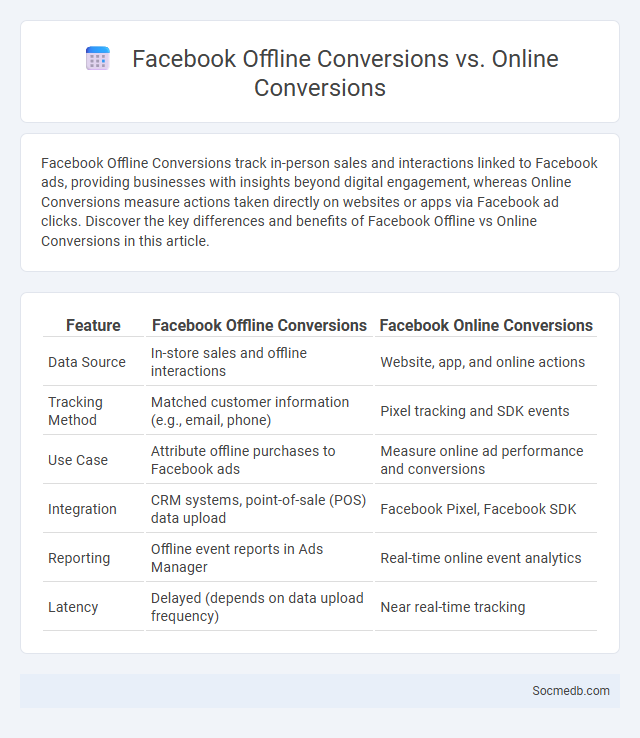
Photo illustration: Facebook Offline Conversions vs Online Conversions
Facebook Offline Conversions track in-person sales and interactions linked to Facebook ads, providing businesses with insights beyond digital engagement, whereas Online Conversions measure actions taken directly on websites or apps via Facebook ad clicks. Discover the key differences and benefits of Facebook Offline vs Online Conversions in this article.
Table of Comparison
| Feature | Facebook Offline Conversions | Facebook Online Conversions |
|---|---|---|
| Data Source | In-store sales and offline interactions | Website, app, and online actions |
| Tracking Method | Matched customer information (e.g., email, phone) | Pixel tracking and SDK events |
| Use Case | Attribute offline purchases to Facebook ads | Measure online ad performance and conversions |
| Integration | CRM systems, point-of-sale (POS) data upload | Facebook Pixel, Facebook SDK |
| Reporting | Offline event reports in Ads Manager | Real-time online event analytics |
| Latency | Delayed (depends on data upload frequency) | Near real-time tracking |
Introduction to Facebook Conversions
Facebook Conversions track specific actions users take after interacting with your ads, such as purchases, sign-ups, or page views, allowing precise measurement of ad effectiveness. By setting up conversion events through Facebook Pixel, You can monitor and optimize your campaigns to achieve higher ROI. Understanding these metrics helps strategically tailor Your advertising efforts to increase engagement and drive business growth.
What Are Offline Conversions?
Offline conversions refer to actions completed by customers outside of digital channels, such as in-store purchases, phone orders, or consultations, which can be tracked back to online social media campaigns. These conversions provide valuable insights into how social media advertising influences real-world sales and customer behaviors, bridging the gap between virtual engagement and physical transactions. Businesses use tools like CRM systems and offline conversion tracking in platforms like Facebook Ads Manager to attribute offline sales to specific social media interactions, enhancing marketing ROI analysis.
Defining Online Conversions
Online conversions refer to specific actions that your audience takes on social media platforms, such as clicking a link, signing up for a newsletter, making a purchase, or completing a form. Tracking these conversions helps measure the effectiveness of your social media campaigns by linking user engagement directly to business goals. Understanding and optimizing these actions can significantly improve your return on investment and overall digital marketing strategy.
General Conversion: An Overview
General conversion on social media measures how effectively your content turns visitors into engaged users, customers, or leads across various platforms. Key metrics include click-through rates, sign-ups, purchases, and form completions, reflecting the success of campaigns in driving desired actions. Optimizing your social media strategy involves analyzing audience behavior and tailoring content to boost these conversion rates.
Key Differences: Offline vs Online Conversions
Offline conversions involve in-person interactions or purchases tracked through methods like phone calls, receipts, or customer visits, emphasizing tangible, direct consumer engagement. Online conversions are measured via digital actions such as form submissions, e-commerce sales, or app installs, leveraging data analytics and tracking pixels for real-time attribution. The key difference lies in data accuracy and immediacy, with online conversions offering instant, granular insights, whereas offline conversions require integration of offline data for comprehensive measurement.
Tracking and Measuring Offline Conversions
Tracking and measuring offline conversions through social media campaigns involves integrating tools like Facebook Offline Conversions API and Google Ads Offline Conversion Tracking to connect digital interactions with in-store purchases or phone calls. Utilizing customer relationship management (CRM) systems and unique promo codes further enhances the accuracy of attributing offline sales back to specific social media efforts. This approach enables precise ROI analysis and optimizes marketing strategies by bridging the gap between online engagement and real-world consumer actions.
Tracking and Measuring Online Conversions
Tracking and measuring online conversions on social media platforms involves analyzing key metrics like click-through rates, engagement levels, and conversion paths to assess campaign effectiveness. You can leverage tools such as Facebook Pixel, Google Analytics, and UTM parameters to capture precise data on user actions and attribution. Optimizing these insights helps refine targeting strategies, improve ROI, and drive higher conversion rates from your social media efforts.
Benefits of Using Offline Conversions
Offline conversions enhance social media marketing by accurately tracking customer actions that occur outside digital platforms, such as in-store purchases and phone inquiries. This data-driven insight improves ad targeting and return on investment (ROI), enabling advertisers to attribute sales to specific campaigns and optimize strategies accordingly. Leveraging offline conversion tracking strengthens the connection between online engagement and real-world business outcomes, boosting overall marketing effectiveness.
Use Cases: When to Choose Offline or Online Conversions
Offline conversions are ideal for businesses with in-person sales or events, enabling tracking of phone calls, store visits, or purchases that originate from social media campaigns. Online conversions work best for e-commerce, app downloads, or lead generation, allowing precise measurement of actions like form submissions, add-to-cart events, and online purchases. Choosing between offline and online conversions depends on the customer journey and sales process, ensuring accurate attribution and optimized ad targeting across platforms like Facebook, Instagram, and LinkedIn.
Choosing the Right Conversion Strategy for Your Business
Selecting the right conversion strategy on social media involves analyzing your target audience's behavior and platform-specific engagement metrics. Businesses must tailor their approach by leveraging data-driven insights such as click-through rates, conversion funnels, and customer journey mapping to maximize ROI. Optimizing content formats like video ads, retargeting campaigns, and interactive posts ensures effective lead generation and sales growth.
 socmedb.com
socmedb.com